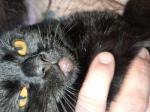Tips On Protecting Your Cat's Health
Your cat's health is, of course, largely in your hands. For your cat, quality of life and, to some extent, how long that life is, depends upon the quality of care you provide.
To assist cat owners with that monumental and all important task, below are some things you can do to help ensure your cat is healthy and happy. These tips and suggestions are compiled from, among other sources, veterinarians, personal experience, cat welfare organizations, and other cat lovers.
Some of these tips you've heard before, including some I've outlined on this site in various places. Others, however, you may not have seen talked about much.
Among the list are keeping cats indoors, keeping emergency numbers handy, and providing an ample supply of toys.
- Indoor Cat vs. Outdoor Cat-- Every major organization that supports the welfare of domestic cats advocates keeping them indoors. In fat, the Humane Society of the United States says that one of the best ways to keep your cat from contracting preventable feline illnesses is to do exactly that.
No matter how you feel about this issue, the statistics for outdoor cats are not good. Injury and illness rates are higher, and life expectancy is far shorter, than indoor cats. It's clear that being an indoor cat is better for your cat's health. - Vaccinations --
In addition to keeping cats indoors, the other thing the HSUS recommends is to administer vaccinations against communicable diseases.
You should be aware, however, that some feline health experts question the once per year cat vaccination schedule recommended by manufacturers, and there are some risks. Question your veterinarian on this and get a dialogue going. - Stray Cats --
Don't bring stray cats into the house. Assume that any stray cat you encounter could be ill or carrying a disease of some kind.
Cats should be checked by a vet before entering a home with an existing cat. - Adopting New Cats -- Any new cats or kittens added to the house should go to the vet before coming home. They should then have a quarantine period and be introduced to resident cats slowly.
- Shoes Off --
Leave your shoes at the door. The Japanese have it right. Take your shoes off when you come in the house.
All those pesticides, bacteria, and viruses that you bring in on your shoes spread all over the floor, and right down there where your cat spends much of her time. I should do this one, but I don't. - Outdoor Cat Enclosures -- To allow your cat to experience the outdoors, provide a safe, protected outdoor enclosure for your cat. Even if it's just a windowsill unit, you can give your cat a safe taste of the outdoors.
- Exercise Your Cat --
Exercise your cat daily. Many house cats, especially indoor cats are not getting enough exercise. Combine this lack of exercise with a high carbohydrate diet, and you end up with a fat kitty.
Cats usually exercise in relatively short bursts. Interactive toys, like the fishing pole type toy Da Bird, are good choices. It's possible to walk a cat, but you usually have to ease them into it. Use a harness and not a collar, and start by having your cat wear the harness around the house for a few days. - Play with your cat -- In addition to exercising your cat, play with your cat often. If your cat is prone to destructive behavior, the diagnosis may be boredom. Playing with your cat on a regular basis will give your cat more exercise, reduce boredom, and improve the cat-human bond.
- Scoop the box -- The dreaded cat litter box! Litter box problems are a huge issue impacting your cat's health, and the number one behavioral reason adult cats are given up to shelters. Scoop the litter box at least daily, and change out the litter completely every few weeks. Give the box a thorough cleaning when you do.
- Cat fleas --
Flea control is an essential part of protecting your cat's health. Cat fleas can lead to blood loss and anemia, as well as the spread of feline parasites.
In addition, some cats are more sensitive to flea bite allergy than others, and are miserable with even just a few flea bites. Opt for natural flea control, however, rather than potentially harmful chemicals.
More Tips
Below are more tips on taking care of your cat's health.
- To help protect your cat's health and safety, "cat proof" your home.
- As with any mammal, your cat's health is closely tied to diet. Feed your kitty a high quality low carbohydrate diet including premium cat food.
- Get a scratching post or board. Scratching relieves stress, stretches muscles, and gives your cat some exercise.
- Take your cat to the vet at least once a year for annual checkups.
- Take your cat to the vet twice a year if she is elderly, or has specific health problems.
- Give your cat ample space to move around, with varying sleeping spots that are draft free.
- Provide an ample supply of cat toys.
- Refresh your cat's toy supply by rotating them out and making them seem new, as well as buying new toys from time to time. This will reduce boredom and encourage exercise.
- Put together the right grooming tools and groom your cat daily.
- Check your cat at least weekly for health problems or signs of illness.
- Know your cat's routines, eating habits, and behaviors and be aware of any changes.
- Keep your vet's emergency number on the refrigerator, in your wallet, and on your speed dial.
- Keep the number for the Animal Poison Control Center on the refrigerator, in your wallet, and on your speed dial.
- When adopting a purebred cat, make sure you choose a cat breeder who screens for breed specific health problems, and offers a health guarantee.




Comments: What do you think?
Have your say about what you just read. Leave me a comment in the box below.